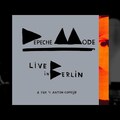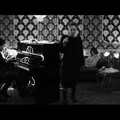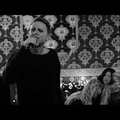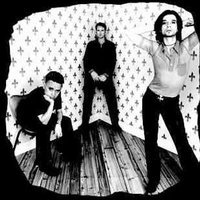Twenty years ago, the odds on Depeche Mode still being arena-filling superstars long into the 21st century looked pretty thin. Torn apart by internal friction and drug addiction, the veteran electro-rock band’s early 1990s tours went down in history as the most debauched carnivals of excess since Emperor Caligula’s final aftershow party in 41 AD. And yet this dysfunctional British trio cleaned up their act, overcame their Spinal Tap tensions and cemented their position as one of the most lucrative touring machines in modern music. Immortalized here by A Most Wanted Man director Anton Corbijn, their most recent world tour played to over 2.4 million people in 32 countries,
Shot over two nights at Berlin’s O2 World arena in November 2013, Live in Berlin is a straight, fan-friendly record of this blockbuster show. Ahead of its DVD release on Nov. 18, it is being launched with one-off theatrical screenings in selected cities next week. Aimed squarely at Depeche Mode’s global army of fiercely loyal disciples, it is guaranteed healthy sales and sell-out cinema audiences. As a solid record of a state-of-the-art techno-rock tour mounted on a Wagnerian scale, it pushes all the right buttons. But there is little in this fairly conventional rock-doc package that will attract new converts.
Although Depeche Mode are primarily known as an electronic band, their 2013 album Delta Machine was one of the most rocky and bluesy of their 30-plus-year career. The accompanying live show reflects this with unusually prominent use of guitar by the band’s principal songwriter Martin Gore, while the overall sound is bulked out as usual by drummer Christian Eigner and auxiliary keyboard player Peter Gordeno. This ballsy, riff-grinding treatment makes for a sluggish start, with even disco-sleek tunes like Policy of Truth acquiring extra bass-heavy ballast. But energy levels build and build over the two hours.
Always something of a frustrated heavy rocker, even in the band’s kindergarten synth-pop days, Dave Gahan is clearly at home in this more raunchy reptilian mode. In gothic mascara, dainty beard and slicked-back hair, the 51-year-old singer becomes a swashbuckling sleaze-rock pirate onstage, copping dance moves from Elvis Presley, Mick Jagger and Freddie Mercury. He is utterly preposterous at times, but in an entertaining way, like a less annoying Russell Brand.
Barely 20 minutes into the set, as the clanging doom chords of Black Celebration descend, Gahan has ripped open his sweat-soaked waistcoat to reveal a tattoo-covered torso. When the stomping glam-rock anthem Personal Jesus arrives, he is spinning like a dervish and throwing messianic poses. But he’s not the Messiah, he’s a very naughty boy.
As is traditional, Gore takes over from Gahan for a handful of aching, heartbroken ballads. Despite being the band’s musical kingpin for decades, he looks genuinely terrified in the spotlight. Meanwhile, third founder member Andrew Fletcher spends most of the show hunched impassively behind his keyboard, his musical contribution so minimal that he literally appears to stand motionless during some numbers, like a confused tourist who has wandered onstage by mistake.
There is little depth or sophistication to these stadium-sized techno torch songs, just pure operatic emotion, adolescent alt-rock angst blown up to IMAX dimensions. This may help explain why Depeche Mode’s global audience endures long after many of their smarter, cooler, more critically revered contemporaries have faded. This is not intellectual hipster music, more like electronic heavy metal. Indeed, during the surging techno-gospel climax of I Feel You, Gahan and Gore begin headbanging together in front of the drum kit. This is dumb but great fun, middle-aged multimillionaires indulging their inner Beavis and Butt-head.
Long before he made the leap to directing award-winning features like Control, The American and A Most Wanted Man, Corbijn was a celebrated rock photographer and visual consultant to music heavyweights including U2, Bryan Adams and Coldplay. But his longest and most intense collaboration has been with Depeche Mode, handing almost all the band’s photo shoots, videos, album sleeves and concert visuals for the last 28 years.
As a photographer, Corbijn has a strong, instantly recognizable high-art aesthetic. But as a stage designer and documentary director, his work here feels disappointingly conventional. Divided into giant interlocking triangles, the gigantic video screen behind the stage mostly relays magnified band footage and abstract Pop Art patterns. All the same, there are some striking visual interludes. A patchwork of cute doggy faces serves as the comically surreal accompaniment to Precious, while the super-sized bodies of three female contortionists pressed against glass provide an arresting backdrop to A Question of Time. A few more of these inspired additions would have been welcome.
Corbijn’s treatment of the band’s performance is also a little functional, sticking firmly within generic rockumentary rules. In fairness, all live music films are restricted by their subject matter, but several recent examples have demonstrated how smart auteurs can subvert or transcend these limitations. Nick Fenton and Peter Strickland’s Bjork documentary, Florian Habicht’s Pulp and David Lynch’s Duran Duran Unstaged all spring to mind. Despite being pioneers of the modern concert movie with DA Pennebaker’s 101 in 1989, Depeche Mode have played it pretty safe ever since.
With their dark, kinky, sexually charged music, Depeche Mode were once a challenging alternative to the mainstream. Three decades later they are a firmly established brand in the pop marketplace. Arguably the biggest cult band in the world, with over 100 million album sales behind them, they are also seasoned stage performers with solid business instincts for giving their customers exactly what they want. Live in Berlin stays well within the comfort zone of band and fans alike.
Production company: Sony Music
Cast: Dave Gahan, Martin Gore, Andrew Fletcher, Christian Eigner, Peter Gordeno
Director: Anton Corbijn
Producer: Kirsten Sohrauer
Exec utive producers: Jonathan Kessler, Alex Pollock
Cameras: Anton Corbijn, Philipp Hennig, Jan-Hinrich Hoffman, Martin Schlecht, Oliver Moron
Editor: James Rose
Sound: Friedemann Frank
Lighting designer: Paul Normandale
No rating, 129 minutes




